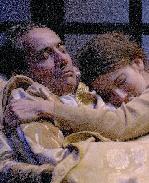SITE GUIDE
SEARCH
REVIEWS
REVIEW ARCHIVES
ADVERTISING AT CURTAINUP
FEATURES
NEWS
Etcetera and
Short Term Listings
LISTINGS
Broadway
Off-Broadway
NYC Restaurants
BOOKS and CDs
OTHER PLACES
Berkshires
London
California
New Jersey
DC
Philadelphia
Elsewhere
QUOTES
TKTS
PLAYWRIGHTS' ALBUMS
LETTERS TO EDITOR
FILM
LINKS
MISCELLANEOUS
Free Updates
Masthead
Writing for Us
A CurtainUp Review
The Coffee Trees
By Elyse Sommer
|
Our primary goal in mounting repertory seasons like this is to demonstrate how classics have remained relevant beyond the society in which they were created. We hope these interpretations of Chekhov's masterpiece shed some light on the play's historic importance.— Eric Parness, the Resonance Ensemble's artistic director
|

Chris Ceraso and Elizabeth A. Davis in Coffee Trees
(Photo: Jon Kandel )
|
Interesting and adventurous as Resonance Ensemble's dedication to presenting a classic in repertory with a new play it inspired is, maybe it's a concept that's difficult to bring off successfully—, especially for the living playwright who, instead of just letting a play take shape organically, must remember to make the connection with the already established play. Last year the company used Moliere's The Imaginary Invalid to present a then-and-now pairing. The new version called The Mail Order Bride was written by Charles Mee who's made quite a career of using Greek plays to create Mee updates. But while Mee seemed like a likely candidate to successfully deal with the Resonance old-new paired play repertory, his Mee-too Moliere didn't work.
Arthur Giron has transformed Chekhov's Russians into the Escalante family who own a coffee plantation in the highlands of Guatemala. The time is 1997, a year that marked the end of a 35-year civil war between communist guerillas and conservative landowners. It's an intriguing setting. And starting the action with the return of the Escalantes' glamorous matriarch after a self-imposed exile in Europe after the rebel guerillas kidnapped and killed her son, is a promising setup for paralleling the plot and characters of The Cherry Orchard.
Since The Coffee Trees is billed as a new play rather than a straight adaptation, Giron can't be faulted for departing drastically from Chekhov The problem is that, while the theme of building some sort of continuity from chaotic change is clear enough, Giron's Guatemalan story is so stuffed with plot complications and is so different in tone from Chekhov, that the similarities between the Russian and Guatemalan characters come off as awkward and forced. Giron would have been better off concentrating on making the fantastic elements and the plot generally more convincing.
Director Marion Castleberry does little to smooth the shift from the Chekhovian opening to the more fantastical plot developments or to tone down the overly flamboyant performance of Christine Farrell as the returning Elena Reyes de Escalante. A number of other actors could have used help in downplaying the excesses of their characters —especially Elena's alcoholic doctor brother (Chris Ceraso). . . the wounded guerilla (Dan Domingues) who turns out to have a surprising connection to the family. . . and Manny (Steven Pounders), the wealthy American ex-soccer star Elena has brought home to marry her oldest daughter and who comes off as a somewhat saintly dimwit.
Elizabeth A. Davis is lovely as well as more understated as the daughter who has kept the household together in Elena's absence, but her using her catechism teaching to function as a priest is one of numerous questionable plot points. Another more emotionally controlled performance comes from Teddy Canez as Lopez, the Indian version of Chekhov's suddenly wealthy peasant, though his meek acquiescence to being married to the Escalante servant Bombi (Annie Henk) is another plot development that doesn't bear closer examination.
The production is extremely handsome, thanks to Dustin O'Neill's design for the schoolroom that's been kept unchanged as a memorial to the kidnapped and killed son. in the Escalante home. The room and the volcano overarching it are handsomely lit by Bobby Bradley. You'll see the work of the same designers and some of the actors in The Cherry Orchard which plays on alternating days. It's Checkhov American style with an American South circa 1948 setting. It should be interesting to see how Eric Parness, the artistic director spearheading the Resonance Ensembles double features, deals with Chekhov's original script.
|
THE COFFEE TREES Resonance Ensemble at Beckett Theatre, 410 West 42nd St. 212-279-4200 or www.resonanceensemble.org. Cast:Teddy Canez, Chris Ceraso, Elizabeth A. Davis, Dan Domingues, Christine Farrell,Annie Henk, Veronica Matta, Steven Pounders, and Victor Truro. Sets: Dustin O'Neill Costume: Sidney Shannon Lighting: Bobby Bradley Sound: Nick Moore From 9/28/07 to 10/21/07; opening 10/03/07. Tuesdays at 7pm, Wednesdays through Fridays at 8pm, Saturdays at 2pm &8pm, and Sundays at 2pm &7pm Tickets are $18 Reviewed by Elyse Sommer October 2nd press performance In repertory with THE CHERRY ORCHARD, adapted by Eric Parness from the translation by Julius West. Cast: Alberto Bonilla, Chris Ceraso, Brian D. Coats, Elizabeth A. Davis, Bill Fairbairn, Susan Ferrara, Sacha Iskra, Ben Masur, Jessica Myhr, James Ware, Kari Nicole Washington, and Evan Zes. Designers: Same as above. |
|
©Copyright 2007, Elyse Sommer.
Information from this site may not be reproduced in print or online without specific permission from esommer@curtainup.com

